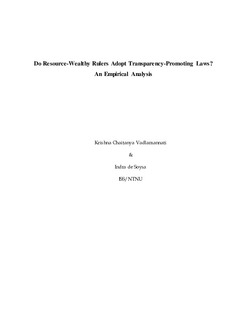| dc.contributor.author | Vadlamannati, Krishna Chaitanya | |
| dc.contributor.author | de Soysa, Indra | |
| dc.date.accessioned | 2017-11-29T09:24:04Z | |
| dc.date.available | 2017-11-29T09:24:04Z | |
| dc.date.created | 2017-01-04T11:03:45Z | |
| dc.date.issued | 2016 | |
| dc.identifier.citation | International Studies Quarterly. 2016, 60 (3), 457-474. | nb_NO |
| dc.identifier.issn | 0020-8833 | |
| dc.identifier.uri | http://hdl.handle.net/11250/2468349 | |
| dc.description.abstract | Some argue that the right kinds of institutions mitigate, or even prevent, the development of “natural resource curses.” Rulers with access to resource wealth, however, are unlikely to adopt such institutions, because doing so would undermine their discretionary power. We examine this proposition by testing whether countries with access to natural resource wealth prove less likely to adopt transparency-promoting Freedom of Information (FOI) laws. Using panel data on 139 countries between 1980 and 2012 (33 years), we find that, after accounting for current levels of democracy and the quality of institutions, countries deriving rents from natural resource are, indeed, less likely to adopt FOI laws. We also find that oil, but not other kinds of resources, is robustly related to a lower probability of adopting FOI laws. However, in countries with strong democracy and high institutional quality, higher income from resources is positively associated with the chance of adopting FOI laws. This suggests that rulers of countries with high resource wealth need to face high political constraints already before they adopt institutional changes. It follows that global policy aimed at increasing transparency within resource-wealthy states should focus efforts on strengthening democracy in ways that increase political competition. | nb_NO |
| dc.language.iso | eng | nb_NO |
| dc.publisher | Oxford University Press | nb_NO |
| dc.title | Do resource-wealthy rulers adopt transparency-promoting laws | nb_NO |
| dc.type | Journal article | nb_NO |
| dc.type | Peer reviewed | nb_NO |
| dc.description.version | acceptedVersion | nb_NO |
| dc.source.pagenumber | 457-474 | nb_NO |
| dc.source.volume | 60 | nb_NO |
| dc.source.journal | International Studies Quarterly | nb_NO |
| dc.source.issue | 3 | nb_NO |
| dc.identifier.doi | 10.1093/isq/sqw026 | |
| dc.identifier.cristin | 1420603 | |
| dc.relation.project | Norges forskningsråd: 231757 | nb_NO |
| dc.description.localcode | This is a pre-copyedited, author-produced version of an article accepted for publication in International Studies Quarterly following peer review. The version of record is available online at:https://academic.oup.com/isq/article/60/3/457/2469894 . Locked until 18 August 2018 due to copyright restrictions | nb_NO |
| cristin.unitcode | 194,67,25,0 | |
| cristin.unitname | Institutt for sosiologi og statsvitenskap | |
| cristin.ispublished | true | |
| cristin.fulltext | postprint | |
| cristin.qualitycode | 2 | |
